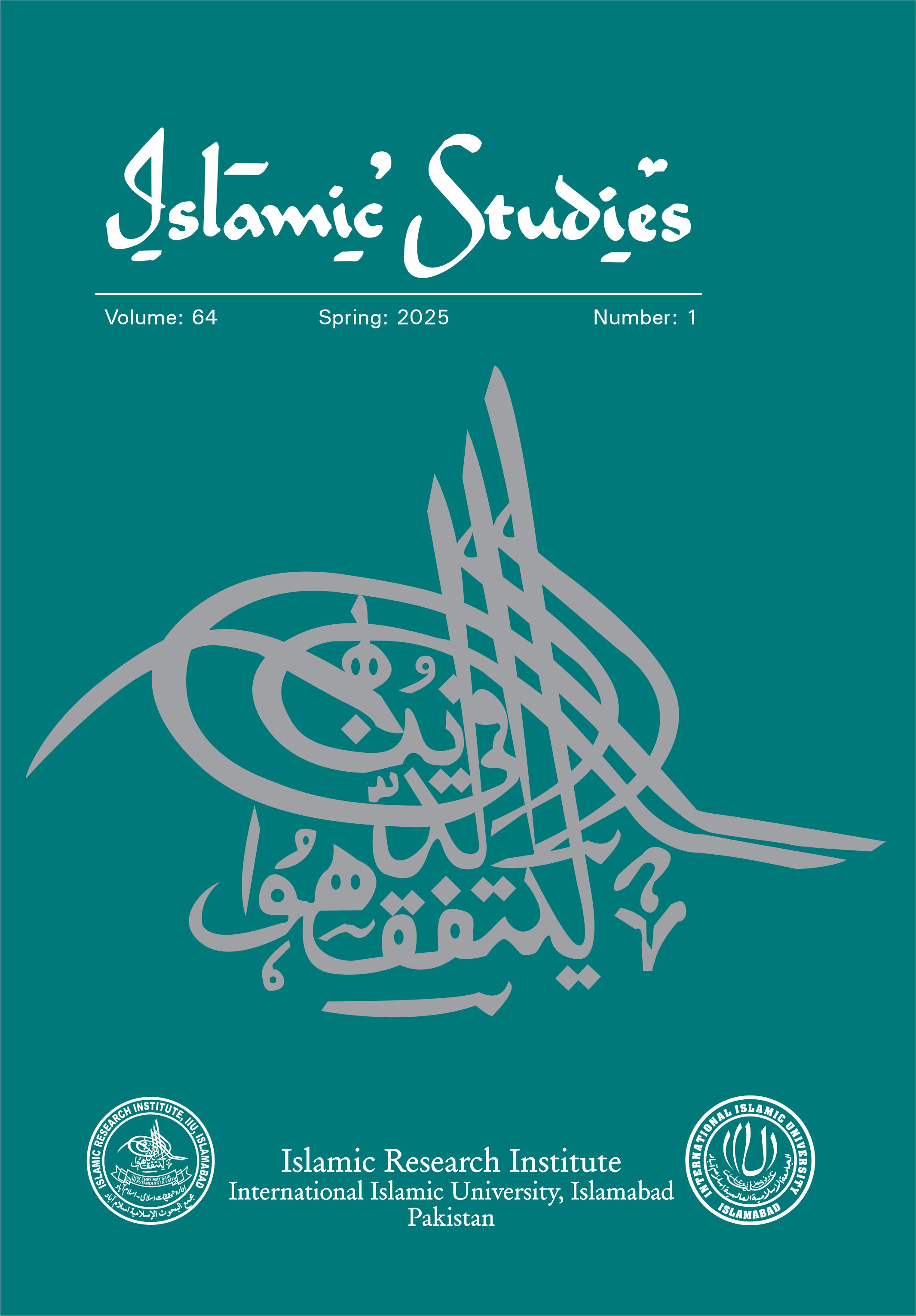Divergent Interpretations of Section 4 of the Muslim Family Laws Ordinance 1961 by the Superior Judiciary of Pakistan
DOI:
https://doi.org/10.52541/isiri.v64i1.3393Keywords:
orphaned grandchildren, inheritance rights, superior courts, Pakistan, interpretation, section 4, share.Abstract
Representational succession under Section 4 of the Muslim Family Laws Ordinance 1961 was introduced to reduce the economic sufferings of orphaned grandchildren. The superior courts of Pakistan have interpreted it divergently, showing confusion about the law on the part of the legislature and judiciary. This article analyses different interpretations of Section 4 by the superior judiciary. It shows that courts initially interpreted Section 4 on technical grounds and declined to grant any share to orphaned grandchildren. Later, courts interpreted it literally and awarded the entire share of a deceased child to his orphaned children. In other instances, courts presented a restricted interpretation. The binary interpretation of Section 4 has worsened the matter and further puzzled the distribution of shares to grandchildren. Therefore, the judiciary needs to develop a consistent approach in constructing and applying Section 4 for clarity in the distribution of shares to grandchildren.
References
Abdul Ghafoor v. Mst. Anwar CLC 1985 Peshawar 818.
Abdul Huq, A. W. M. “Section 4 of the Muslim Family Laws Ordinance, 1961: A Critic.” The Northern University Journal of Law 1 (2010): 7-13. https://www.banglajol.info/index.php/NUJL/article/view/18521/12971.
Abdul Qayyum v. Mst. Asma Ejaz CLC 2015 Peshawar 162.
Ahmad, Khurshid. Marriage Commission Report X-Rayed. Karachi: Chiragh-e-Rah Publications, 1959.
Ahmad, Nabeel. “A Research Review of Orphan Grandson’s Inheritance in the Light of Sharia and Pakistani Law.” Al-Absar 1, no. 1 (2022): 69-86.
Allah Rakha v. Federation of Pakistan PLD 2000 FSC 01.
Anderson, J. N. D. “Recent Reforms in the Islamic Law of Inheritance.” The International and Comparative Law Quarterly 14, no. 2 (1965): 349-65.
Carroll, Lucy. “Orphaned Grandchildren in Islamic Law of Succession: Reform and Islamization in Pakistan.” Islamic Law and Society 5, no. 3 (1998): 409-47.
Cheema, Shahbaz Ahmad. “Section 4 of Muslim Family Laws Ordinance 1961, Pakistan: An Exploration of Interpretive Tensions.” Manchester Journal of Transnational Islamic Law & Practice 18, no. 2 (2023): 2-19. https://doi.org/10.2139/ssrn.4388281.
Coulson, N. J. Succession in the Muslim Family. Cambridge: Cambridge University Press, 1971.
Dr. Mahmood ur Rehman Faisal v. Government of Pakistan PLD 1994 SC 607.
Faruki, Kemal. “Orphaned Grandchildren in Islamic Succession Law: A Comparison of Modern Muslim Solutions.” Islamic Studies 4, no. 3 (1965): 253-74.
Fatima, Haseeb. “A Critical Appraisal of Obligatory Bequest as Prevalent in Muslim Countries.” Islamic Studies 63, no. 2 (2024): 213–40. https://doi.org/10.52541/isiri.v63i2.3071.
Fatima, Haseeb. “Inheritance Rights of Orphaned Grandchildren under Section 4 of Muslim Family Law Ordinance, 1961 and its Alternative Solutions.” Law and Policy Review 3, no. 2 (2024): 21-42. https://doi.org/10.32350/lpr.32.02.
Fatima, Haseeb. “Succession Rights of Orphaned Grandchildren in Pakistan: An Examination of Prospective or Retrospective Application of Section 4 of Muslim Family Laws Ordinance, 1961 by Pakistani Courts.” Legal Transformation in Muslim Societies 1, no. 2 (2024): 32-50.
Fazeelat Jan v. Sikandar PLD 2003 SC 475.
Federation of Pakistan v. Mst. Farishta PLD 1981 SC 120.
Ghulam Haider v. Mst. Nizam Khatoon YLR 2002 Lahore 3245.
Habibur Rahman, M. “Problems for Orphaned Grandchildren in Succession: A Study of Suggestions.” Islamic Studies 25, no. 2 (1986): 211-26.
Haji Gulshan v. Abdul Qayoom PLD 1991 Peshawar 85.
Inaam Ullah. “Muslim Family Law Ordinance Section 4, Inheritance of Grandson in the Light of Islamic Teachings.” Islamabad Islamicus 1, no. 1 (2018): 81-105.
Iqbal Mai v. Falak Sher PLD 1986 SC 228.
Kamal Khan v. Mst. Zainab PLD 1983 Lahore 546.
Karim Bakhsh v. Mst. Zulekhan YLR 2004 Lahore 637.
Kuchchal, M. C. Mercantile Law. 6th ed. Lucknow: Vikas Publishing House, 2006.
Manzoor Elahi v. Tahir Masood 1987 CLC 297.
Mst. Aqsa Sabir v. Dr. Sajjad Hussain MLD 2015 Peshawar 652.
Mst. Bhaggay Bibi v. Mst. Razia Bibi 2005 SCMR 1595.
Mst. Farishta v. Federation of Pakistan PLD 1980 Peshawar 47.
Mst. Kaneezan Bibi v. Muhammad Ramzan 2005 SCMR 1534.
Mst. Qabal Jan v. Mst. Habab Jan 1992 SCMR 935.
Mst. Rashida Begum v. Mst. Rehana Nasreen MLD 2004 Lahore 1304.
Mst. Saabran Bibi v. Muhammad Ibrahim CLC 2005 Lahore 1160.
Mst. Saira Yousaf v. Sher Muhammad CLC 2012 Board of Revenue Punjab 1593.
Mst. Tabassam Bibi v. Abdur Rashid Khan CLC 1999 Lahore 1216.
Mst. Zainab v. Kamal Khan PLD 1990 SC 1050.
Mst. Zarina Jan v. Mst. Akbar Jan PLD 1975 Peshawar 252.
Muhammad Fikree v. Fikree Development Corporation Ltd. PLD 1988 Karachi 446.
Mukhtar Ahmad v. Mst. Rasheeda Bibi 2003 SCMR 1664.
Munir, Muhammad. “The Share of Orphaned Grandchildren under Islamic Law and Pakistani Legal System: A Re-evaluation of Representational Succession in Section 4 and Its (Mis)interpretation by Courts.” The Asian Yearbook of Human Rights and Humanitarian Law 2 (2018): 95-116.
Saeed Ahmad Malik v. Shamim Akhtar 1999 SCMR 1558.
Saeed Ahmad v. Mahmood Ahmad PLD 1968 Lahore 520.
Sardar Muhammad v. Mst. Jantey YLR 1999 Lahore 1928.
Umar Farooq v. Mst. Shagufta Nasreen MLD 1999 Peshawar 703.
Usmani, Muhammad Taqi. Hamārē ‘Ā’ilī Masā’il (Our Family Issues). Karachi: Dār al-Ishā‘at, 1963.
Yousaf Abbas v. Mst. Ismat Mustafa PLD 1968 Karachi 480.
Zainul Hassan Mian v. Mst. Khuwand Naka MLD 1998 Peshawar 1587.
Zamir Muhammad Khan v. Fateh Khan CLC 1993 Lahore 133.
Downloads
Published
How to Cite
Issue
Section
License
Publication of material in the journal means that the author assigns copyright to Islamic Studies including the rights to electronic publishing. This is, inter alia, to ensure the efficient handling of requests from third parties to reproduce articles as well as to enable wide dissemination of the published material. Authors may, however, use their material in other publications acknowledging Islamic Studies as the original place of publication. Requests by third parties for permission to reprint should be addressed to the Editor, Islamic Studies.


